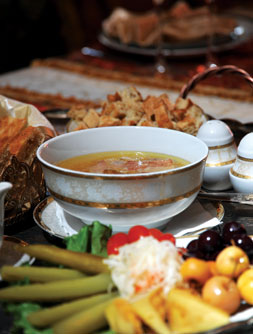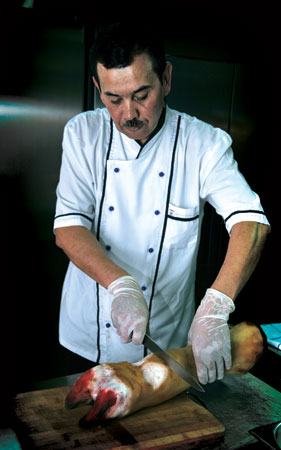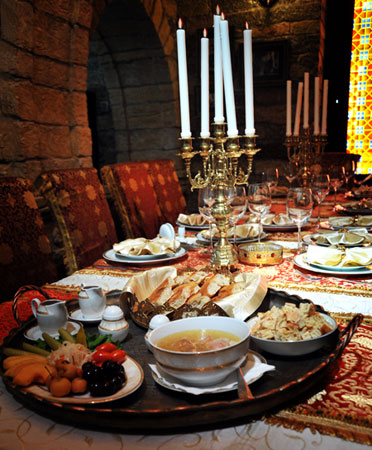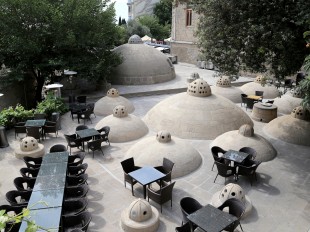 Love it or loathe it, khash is a local institution. There’s nothing that Azerbaijani men like more than to start a winter day with a steaming bowl of this glutinous, stewed trotter soup. Khash enjoys a reputation as a hangover cure, especially if it’s accompanied by some hair of the dog – a glass or two of vodka.
Love it or loathe it, khash is a local institution. There’s nothing that Azerbaijani men like more than to start a winter day with a steaming bowl of this glutinous, stewed trotter soup. Khash enjoys a reputation as a hangover cure, especially if it’s accompanied by some hair of the dog – a glass or two of vodka. Khash (written xaş in Azerbaijani), made with slight variations in ingredients, is widespread throughout the South Caucasus, Iran, Turkey, Afghanistan and Central Asia.
In Azerbaijan the khash party, or perhaps that should be khash ceremony, can be held at home or in a cafe or restaurant. Many catering establishments in Azerbaijan offer khash, but the best khash is often to be had at the dedicated cafes.
Classic khash requires great attention and skill from the chef and several hours of slow cooking. If it is made at home, then it is traditional to invite guests to enjoy it with you. The khash season begins in September and runs until April. It is usually eaten early in the morning, accompanied by vinegar and garlic, pomegranate sauce, pickles and herbs. Traditionally, khash is cooked by men and it’s often a good pretext for men to get together.
Properties of khash
Dedicated khash-lovers claim that khash does not like three things: women, brandy and long toasts. Men say in justification that women don’t like the vinegar and garlic eaten with khash, but this saying smacks more of an excuse for men to get together. After all, plenty of Azerbaijani women like khash too.
Khash is drunk only with vodka, never brandy. And long toasts – well, toasts take time and attention away from the food, and khash should be eaten piping hot.
Khash can be heavy going, even for the healthiest of stomachs, but vodka is believed to help digest it. Devotees say that if your doctor recommends you don’t drink vodka, then you had better keep off the khash too.
It is also claimed to have miraculous healing properties, especially when it comes to tackling the effects of over-indulgence. It used to be traditional in the provinces of Azerbaijan for guests to be invited to eat khash the morning after a wedding. In our day, this tradition is still observed in some villages.
 Khash is also good for the bones, and physicians recommend that anyone with a fracture should tuck into a bowl or two.
Khash is also good for the bones, and physicians recommend that anyone with a fracture should tuck into a bowl or two.It’s another tradition to sleep a lot after a khash party, or maybe that’s more of a physical necessity.
What’s most important is that participants in the ancient khash ritual should show their appreciation to the cook who stayed up all night to make the meal. There is a popular saying, the purer a person, the clearer his khash.
Khash has even appeared on the silver screen. It was the subject of a short film, Musical Khash, shot in 1983 by Azerbaijani director Vagif Mustafayev.
Recipe
To make khash, you will need:
• 1 kg/2.2 lbs of sheep´s or cow’s trotters – only the front trotters
• 1 carrot
• 1 onion
• 2-3 cloves garlic
• grape vinegar
• salt & peppercorns
1. Thoroughly wash the sheep´s or cow’s trotters. Singe with a cook´s blowtorch or over a gas flame to remove any hair. Wash again. Using a cleaver, split the trotters along the joints into 2-4 pieces.
2. Put the trotters in a large pan and just cover with cold water. When the water comes to the boil and scum is forming, remove the pan from the heat and discard the water. Wash the trotters thoroughly again.
3. Put the trotters back in the pan and cover with 15 to 20 cm of cold water. Bring to the boil and simmer on a low heat for 4 to 5 hours, traditionally done overnight. At regular intervals skim off the scum that forms on the surface of the water. After the first skimming, add the onion and carrot to the pan as they will help to get rid of the scum. Remove them half way through cooking.
4. When the khash is ready, the meat will fall off the bones. For a more refined khash experience, take the trotters out of the broth, remove the meat from the bones and then return the meat to the broth.
5. Add salt & peppercorns and cook for another 10 minutes or so.
6. Add crushed garlic to two glasses of vinegar and mix well.
7. Serve khash hot with bread and the garlic and vinegar mixture.
A close relative of khash is kalla-pacha, which is made from sheep’s trotters, a sheep’s head and stomach (tripe).
Tales of khash
Legends abound about the origins of khash, but one of the most popular is that the dish passed from the poor to the tables of the rich. The best cuts of meat would be given to the masters, and the rest, the offal and trotters, would be left for the poor. According to one tale, the khan was passing a hut one day when he spotted a pot simmering on a fire. A seductive aroma hung in the air. The khan called his subject and began to ask him about his cooking. Instead of explaining, the poor man invited the khan to sit at his table. The khan ate the khash with relish. When word spread far and wide of how the khan sat at a poor man’s table and ate khash, the dish became a favourite with all classes.
 Rostropovich’s Khash party
Rostropovich’s Khash party Composer Azer Rzayev, an Honoured Art Worker of the Azerbaijan Republic, once told me a funny story about khash.
In the early 1970s, Baku-born cellist Mstislav Rostropovich was preparing to play in Baku. Rostropovich called his friend Rzayev from Moscow the day before the trip. He said he would be arriving at the airport at about 6.00am and asked his friend to come and meet him. Asked why he was coming so early, Rostropovich said that he wanted to go straight from the airport to eat khash. And this is what he did.
Rzayev recalls that in those days there was a restaurant on the way from the airport to the city centre that was famed for its khash.
As agreed, friends and I met Slava at the airport and went to that restaurant. Our feast began at about 6.30 in the morning and continued until afternoon. As we know, khash is digested very slowly, so it is impossible to eat more than two bowls of it. But our Slava ate five bowls and drank a lot of vodka. Although we warned him that eating so much khash wouldn’t be good for him, he ignored us. He said that he had missed khash for a long time. He had been looking forward to coming to Baku and was not going to miss this chance. He said that the best khash in the world is made in Azerbaijan. After our long feast finished, we took Slava to his hotel and went home, looking forward to the next day’s concert.
The next day, at 2:00pm Mstislav Rostropovich was to give his first concert at the Azerbaijan State Philharmonic Society. My friends and I arrived at the concert hall to be greeted by the administrator announcing loudly that Rostropovich’s concert had been postponed. We were very surprised. Asked what had happened, the administrator said that Mstislav Leopoldovich had very high blood pressure and was being seen by emergency doctors. We rushed to Slava’s hotel room where we saw him prostrate on the sofa being given an injection. When he saw me, Slava said, ‘I ignored your advice and it’s cost me a pretty penny.’ Slava liked to joke even in such a terrible situation. Looking at me, he said, ‘Azik let’s establish a new party – the Neokhashists Party. Whoever loves khash can join.’


.jpg)